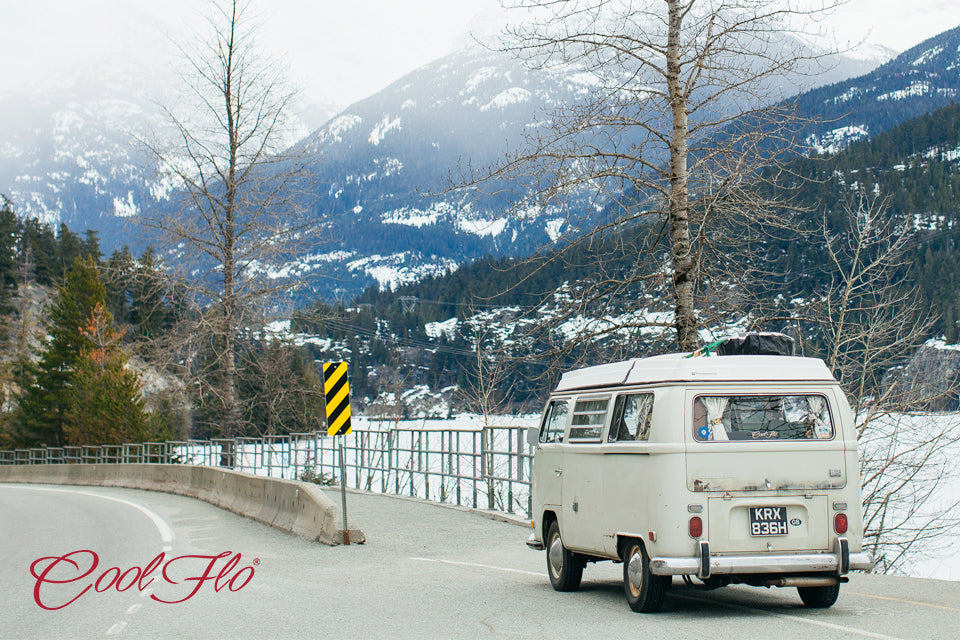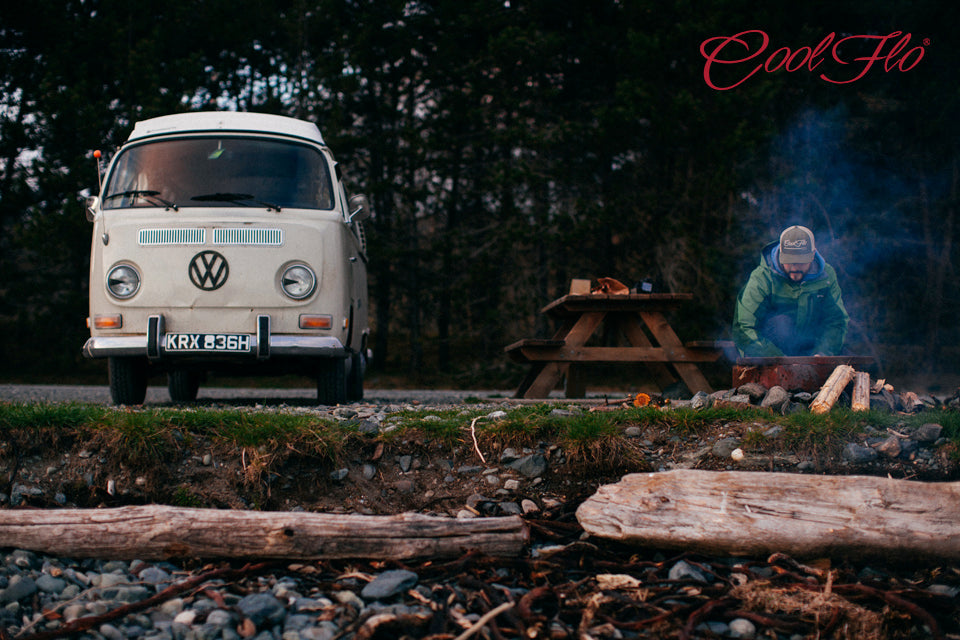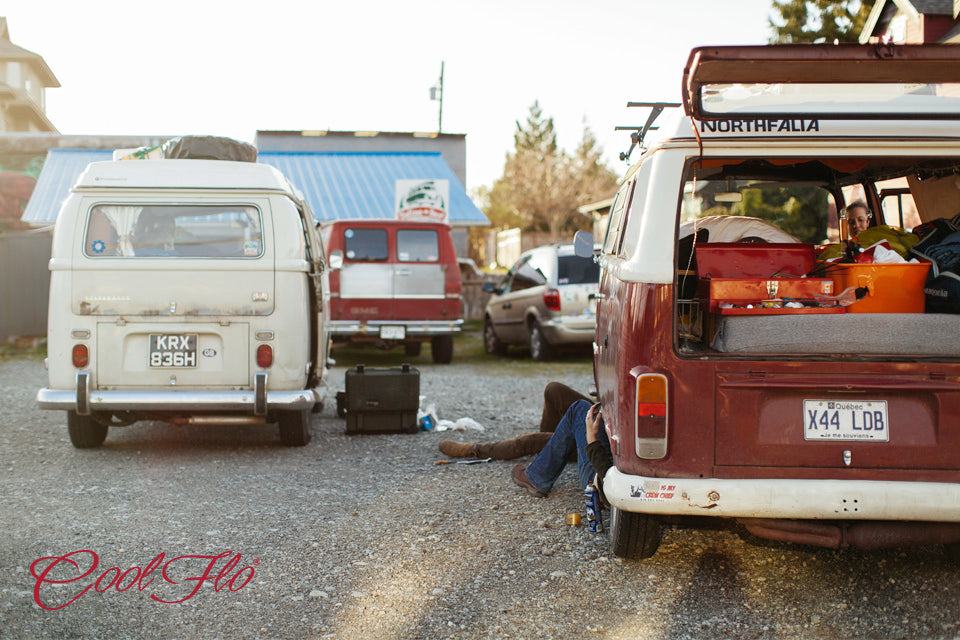Guest blog: Way-Out Westie on how to prepare your VW Camper for winter
Posted on October 20 2017

In this guest blog, Michael from Way-Out Westie offers tips on how to prepare your Volkswagen for the colder season that's just about to hit us in the UK.
We first became friends with Michael from Way-Out Westie when he married his wife Andrea and the pair spent their honeymoon travelling around North America in their 1969 VW camper 'Rocky'. Now back in the UK, Michael has set up Way-Out Westie to help and inspire others to keep their VWs on the road and off on adventures far and wide - as well as offering a mobile service for fellow air-cooled camper and beetle owners in Hertfordshire, Buckinghamshire and Bedfordshire. Over to you Michael…
How to prepare your VW camper for winter
I like to use my camper throughout the winter, having got used to -12 in Canada the UK winters seem mild by comparison. I do however have to ensure my camper is up for whatever the elements can throw at it, I don’t take anything for granted. Here I will go through the preparations I make so I can continue to explore safely throughout the winter.
If you prefer to tuck your pride and joy away for the winter months then scroll down as I will cover what you need to do prior to stopping driving.
Why is winter driving different and what do I need to do?
With the nights drawing in, temperatures dropping and a lot more rain around the strain on your aircooled is different than during the summer. You will use your lights and windscreen wipers more, the roads can become slippery through rain and ice and it most defiantly will get colder.
If you don’t mind getting down and dirty and have the tools to check your VW’s health then go for it, if however you are unsure then get someone to check it for you. This is for your own safety.

Winter checklist
This list covers everything you should consider. You may not need to do all if you serviced your vehicle recently.
1 - Check your tyres
Check for wear, damage and tread depth and ensure they are inflated correctly.
2 - Check your brake fluid
Is your fluid low? Is it old and dark in colour? Brake fluid absorbs water over time and reduces the efficiency of your braking system. It’s good practice to bleed the system and add new fluid yearly/ bi yearly.
3 - Adjust your brakes
Pulling to one side or not holding on the handbrake? Ensure the drums are adjusted correctly and that the handbrake is working within tolerances by adjusting the cables. If everything is adjusted correctly and you still have uneven braking check the wheel cylinders for correct operation and suspect a potential collapsed flexi line.
4 - Check your wipers and washer system
Not sure when the wipers were last changed? Now’s the time do change them. You will be using them a lot over the winter. In-efficient wipers are an MOT fail.
Top up the washer fluid ensuring you use a grade that is suitable for low temperatures. If you have the original washer you will need to pressurise it. If it doesn’t work it’s also an MOT fail, perhaps time to change it to an electronic system?

5 - Check your battery and charging system
Your battery takes a real beating over winter. Batteries hate the cold weather and you will be using wipers and lights (as well as playing your cool tunes) more than in the summer.
A worthwhile investment is a battery charger and a multimeter. Take your battery out and put it on charge for at least 24hours. Then let it sit for another 12-24 hours disconnected (that part is very important) so you can test its resting voltage. Your resting voltage should be around 12.7 volts for a healthy battery. If your battery is below that after a full charge consider changing it.
When the engine is running and battery connected carefully check the battery with a multimeter to check what charge it is receiving. Ideally the alternator should put out between 13.8 and 14.2 volts.
6 - Check your lights
Ensuring you can see and that people can see you coming is pretty darn important. This should be a check your regularly do winter or summer but as you will be doing more night time driving it is even more important.
Get a friend to help and ensure all the lights are working properly. Front sidelights, main and high beam, indicators, hazards, brake lights and reverse and fog lights if you have them fitted.
Most problems I encounter are due to poor earthing or blown bulbs.
7 - Check the engine
It goes without saying that your engine should be regularly serviced and be in good running order. As a minimum on an air-cooled engine you should do the following every 3000 miles on T1 engines and every 5000 miles on T4 engines:
• Oil change & new strainer
• Clean and gap plugs & points, inspect rotor arm, dissy cap, condensor, fan belt & ignition leads.
• Set valve gap, replace rocker gaskets.
• Adjust timing & adjust carburettor
8 - Steering and drive components
You should be getting underneath to check your steering and drive joints and components at least once a year.
You should check / implement the following:
• A Chassis Grease-up
• Check Clutch free play
• Inspect oil and fuel hoses
• Air + fuel filter change
• Compression check
• Check / adjust carb + Timing
• Check gearbox fluid level
• Inspect steering & Suspension rubber and joints for play / damage.
• Check CV joint boots
• Inspect exhaust for leaks

Get Michael's look here
9 - Heating
Now that your camper is running beautifully it’s time to keep you warm on your adventures! Despite its reputation the VW camper and beetle heating system is more than adequate. The bad reputation comes from broken/ disconnected heater control cables and levers, poor quality aftermarket heat exchangers and leaking pipework. It really isn’t rocket science, ensure there is a good sealed airflow from your fanhousing all the way to the cab and that the heat exchangers can open and close properly with the dash controls and you will have toasty feet!
10 - Clean and polish
I adventure out in all weather and rely on the best wax available to protect my paint. Collinite 476, no other words needed, it lasts up to 6 months and is simply the best.
For more tips on keeping your pride and joy in tip top condition visit www.wayoutwestie.com
